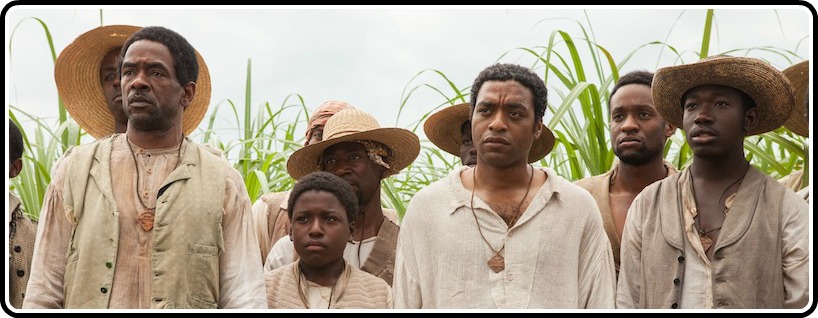
To have a profoundly moving experience while watching a film is always unpredictable, and I’m not just talking about merely living up to expectations here. Though factors like subject matter, the actors involved, and the director behind it can add to heightened levels of anticipation, I’m talking about having such details completely fall away to be totally enthralled by the images onscreen and to be 100% emotionally invested in a story as it plays out. This is what it is like to watch director Steve McQueen’s new film 12 Years a Slave, an emotionally heart-wrenching story about a prosperous free black man who lived in Saratoga, New York in the 19th century named Solomon Northup (Chiwetel Ejiofor) who was thrown into slavery in Louisiana against his will. It is a movie whose narrative simplicity masks a brutally direct true-life-tale of tremendous power, and is unquestionably one of the best movies of the year.
McQueen is no beginner towards difficult subject matter. His first narrative feature Hunger, about the 1981 IRA hunger strike led by Bobby Sands, is probably the best film about The Troubles ever made and his second film Shame is an explicit look at the devastating disorder of sex addiction. 12 Years a Slave chronicles Northup’s ordeal from a successful and refined violinist in upper class New York society to being bought and sold to a series of southern plantation owners (played by Paul Giamatti and Benedict Cumberbatch, and there’s even a cameo by Brad Pitt as a sympathetic Canadian itinerant worker) with an unflinching honesty never before seen in most slavery dramas. In the press leading up to the release of the film, McQueen has been adamant that this story needed to be told and that the tragedy of slavery in America, the single worst thing to ever happen in the country’s history, and its legacy are still a puzzlingly prevalent topic today that warrants further exploration.
McQueen’s M.O. is a confrontational one, but one that never exploits the topics he chooses to tackle. The images he puts in his films may be in your face, but there are definitive reasons for him to force the audience to not look away. In this case, McQueen portrays Northup’s story as it happened as not only a way to historically testify to slavery’s inherent contradictions and complete moral reprehensibility but to also engage in larger themes of survival in the face of utter despair and salvation against all hope. Given his inhuman situation, Solomon—and to a larger extent McQueen—chooses to deal with it in his own way instead of resorting to an exaggerated dramatic construct involving a daring escape or overwrought turmoil meant to imbue the audience with an easy perspective. Make no bones about it, the simple and obvious point is that slavery is bad and there is no definitive way to understand it, yet Solomon says, “I don’t want to survive, I want to live.” It is a line that presents us with perhaps the most achingly sad theme in the film, which is his acceptance of the ability to cope. For Solomon, to live under the inherent absurdity of the circumstances he’s thrown into means to carry on but to never ever lose hope, a sentiment McQueen delicately ties to mutual religious convictions.
McQueen succeeds with the help of a perfect ensemble, anchored by Ejiofor’s uninhibited performance as Northup. This is an actor whose genius could be highlighted by expression alone, giving us a masterclass in human emotion whose outward restraint is measured against a look or a glance that gives the audience absolutely everything you need to know about his desperately conflicted character. A scene in particular where he breaks the fourth wall is simple in its suggestion of the audience’s complicit participation in these events, but on a performance level speaks volumes to Ejiofor’s ability to render everything he’s got into singular moments. Michael Fassbender, who’s been in McQueen’s two previous features, gives a particularly nasty performance as the cruel plantation owner Edwin Epps. His character along with his wife Mary (Sarah Paulson) are the obvious symbols of innate evil for us to counter with, and to that extent they initially come off as conveniently overused clichés, but Epps’ barbaric relationship with his favorite slave Patsey (Lupita Nyong’o)—disturbingly described by him the “queen of the fields”—emphasizes the horrific depth of his character’s incongruous emotional clash between love versus violence. Nyong’o as Patsey, a person born into slavery, is a revelation of instinctual extremes. To slave owners and racists like Epps she is nothing more than a possession, yet to us she represents absolute humanity in the face of unspeakable cruelty, an identifiable personification under unfathomable duress. A scene where Epps forces Solomon to whip her is perhaps one of the most difficult scenes in a movie I’ve ever had to watch, but it overcomes the plain sympathy you feel towards the characters by becoming an emotional culmination where all the film’s complex themes are significantly at play. Everyone involved participates in cinematic perfection.
12 Years a Slave is a complicated film about the depths of human brutality, yet through Solomon’s sobering narrative we find that there is promise in the human spirit despite not being definitely cut and dry. At times it can be exhausting, but watching it thread through its narrative is a profoundly beautiful and agonizing experience, cementing Steve McQueen among the best working directors today. Simply put, 12 Years a Slave moved me and it will move you too.


